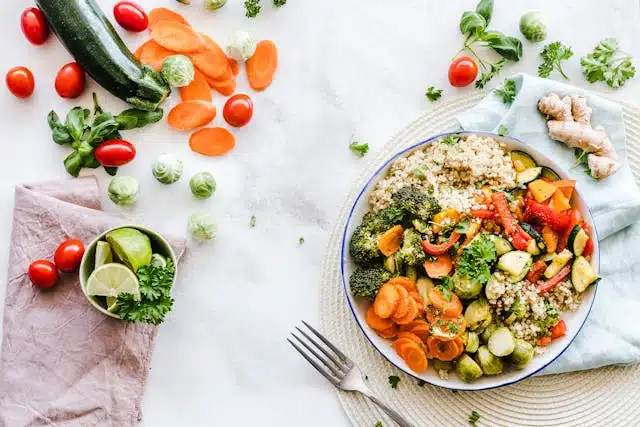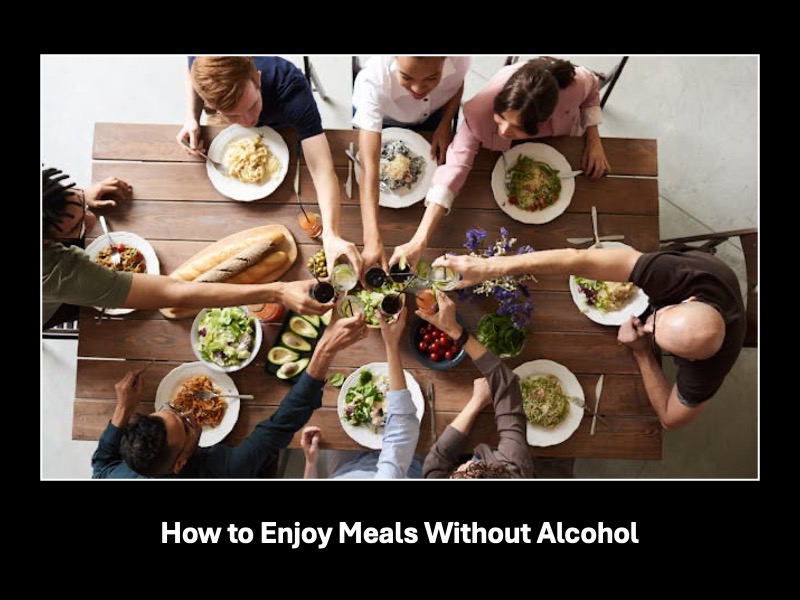How to Enjoy Meals Without Alcohol to Live Fit and Healthy
Learning to enjoy meals without alcohol is one of the most empowering changes you can make for your health, fitness, and overall lifestyle satisfaction.
While alcohol is often treated as a social norm or mealtime staple, removing it from your routine can open the door to more mindful eating, increased digestion, improved sleep, and deeper appreciation for the food you consume.
Alcohol is commonly used to relax, celebrate, or enhance flavors, but its physiological effects, such as blood sugar fluctuations, dehydration, and interference with nutrient absorption, can work against health and performance goals.
For those pursuing a fit and healthy lifestyle, shifting the focus toward nourishing meals and intentional habits can create a stronger connection between food, well-being, and daily energy levels.
Enjoying food becomes easier when you stimulate your senses with flavorful herbs, bold spices, colorful presentations, and satisfying textures.
Whether dining solo, cooking with family, or celebrating with friends, your experience can still feel festive, rewarding, and complete, without relying on alcohol to elevate the occasion.
By making thoughtful changes to your eating environment, beverage choices, and social habits, you can consistently enjoy meals without alcohol while aligning your actions with long-term health and fitness goals.
Why Is It Difficult for Some People to Enjoy Meals Without Alcohol?
For many people, alcohol becomes deeply intertwined with eating rituals, social behavior, and emotional reward pathways, making it psychologically and culturally difficult to separate from meals.
It’s not just about taste; it’s about habit, identity, and expectation.
Alcohol is often used to increase relaxation, reduce social anxiety, or mark the transition from work to leisure.
Over time, this builds strong neural associations between drinking and mealtime satisfaction.
The dopamine response triggered by alcohol—especially when paired with rich food and social interaction—can create a reinforcing cycle that’s hard to break (Volkow et al., 2011).
Culturally, alcohol is also linked with sophistication, celebration, and adulthood.
Wine pairings, dinner toasts, or “unwinding with a drink” become normalized to the point that abstaining may feel isolating or awkward, especially in group settings.
This is compounded by environments where alcohol is always present, such as restaurants, holidays, or even casual dinners with friends.
Physiologically, alcohol can dull taste receptors slightly and slow digestion, which some interpret as “enhancing” the dining experience.
Without it, food may taste sharper, the pace of eating changes, and individuals may feel more emotionally exposed during meals.
Understanding these psychological, social, and sensory patterns is key to overcoming them.
Once recognized, they can be reshaped through mindful eating, healthier social rituals, and flavorful alcohol-free alternatives that support long-term wellness.
Why Is It Important to Avoid Alcohol During Meals If You Want to Be Fit and Healthy?

Avoiding alcohol during meals supports your body’s ability to digest food efficiently, absorb nutrients properly, and recover from exercise, all of which are essential for staying fit and healthy.
While moderate alcohol use is often portrayed as harmless, consuming alcohol with meals can silently undermine your fitness goals in multiple ways.
Alcohol interferes with protein synthesis, a process critical for muscle recovery and growth, particularly after training sessions (Parr et al., 2014).
Even small amounts can reduce testosterone levels and increase cortisol, causing your body to shift into a catabolic state that breaks down muscle rather than building it.
Digestively, alcohol slows gastric emptying and impairs the absorption of essential nutrients, including B vitamins, zinc, and magnesium, which are crucial for energy production, metabolic health, and hormonal balance.
Over time, this can lead to deficiencies that affect performance, immunity, and recovery.
From a metabolic standpoint, alcohol provides “empty” calories (7 kcal per gram) that the body prioritizes for breakdown, pausing fat oxidation in the process.
This is the primary reason alcohol and weight loss don’t go together, as drinking alcohol can make fat loss more difficult, especially when combined with high-calorie meals.
Alcohol also disrupts sleep architecture, diminishing REM and deep sleep cycles needed for recovery, memory consolidation, and hormonal repair.
Even a single drink at dinner can lead to sleep fragmentation and morning fatigue, which can decrease motivation to train or eat well the next day.
Key Takeaway: For anyone pursuing a strong, lean, and energized body, abstaining from alcohol during meals is a simple yet powerful step to improve results and support long-term well-being.
Best Ways to Enjoy Meals Without Alcohol
Choosing to eat without alcohol doesn’t mean giving up enjoyment; it’s about redefining what satisfaction looks and feels like at the table.
When alcohol is removed from the meal, there’s more space to focus on flavor, connection, and how your body truly responds to the food you eat.
By using intentional strategies like enhancing your meals with bold seasonings, trying global cuisines, or creating a more mindful dining atmosphere, you can enrich the eating experience in ways that support both physical health and emotional well-being.
These practical ideas help shift the focus away from what’s missing and toward what’s possible, proving that you can fully enjoy meals without alcohol while nourishing your body and achieving your lifestyle goals.
Enhance Flavor with Bold Spices and Aromatics
Alcohol often adds depth or complexity to meals, but so do garlic, ginger, fresh herbs, chili flakes, and warm spices like turmeric or cumin.
These ingredients stimulate the senses and elevate even the most basic recipes into something truly memorable.
Focusing on vibrant flavor profiles is one of the best kitchen hacks for people trying to get fit and healthy, making alcohol irrelevant to the enjoyment.
Cook with confidence, and let the spices do the heavy lifting.
Explore Global Cuisines That Prioritize Health
World cuisines like Indian, Japanese, Mediterranean, and Thai often feature plant-forward, spice-rich meals that feel indulgent yet support wellness.
These culinary traditions rarely rely on alcohol to create a full experience.
By experimenting with new ingredients and cultural flavors, you expand your palate, discover nutrient-dense dishes, and stay excited about your alcohol-free lifestyle.
Host Themed Alcohol-Free Dinners
Gathering with others doesn’t require wine or cocktails.
Hosting a taco night, Mediterranean spread, or even a DIY sushi dinner adds novelty and focus to the food and company, rather than the drinks.
Include alcohol-free mocktails, festive decorations, or music to match the theme. These dinners become moments of joy and connection, not centered on alcohol, but enhanced by creativity.
Dine with People Who Support Healthy Habits
Eating with others who also support your healthy habits and live an alcohol-free lifestyle reduces pressure and creates space for real connection.
Whether it’s a weekend brunch after a hike or a post-lift meal, the focus stays on shared values and conversation.
Surrounding yourself with people who appreciate wellness-oriented living makes staying consistent with your goals feel easy and rewarding.
Change the Environment for Your Meals
Dining outside, whether it’s in a backyard, at a park picnic, or on a mountaintop after a hike, amplifies the enjoyment of meals.
Fresh air, sunlight, and natural surroundings enhance sensory awareness and relaxation.
These changes in scenery also support mindful eating, which is linked to reduced cravings, better digestion, and stronger satiety signals (Kristeller & Wolever, 2011).
Serve Fresh Fruit or Smoothies as a Satisfying Finish
Instead of reaching for a glass of wine or beer, round out your meal with vibrant fruit or a homemade smoothie.
Mango slices, berry medleys, or green smoothies with ginger and lemon cleanse the palate and offer nutritional benefits.
This practice builds the psychology of eating habits that prioritize nourishment, enjoyment, and mindful choices.
Sip Flavorful Alternatives Like Mocktails or Infused Waters
Alcohol-free drinks don’t have to be boring.
Infused waters with herbs and citrus, sparkling teas, kombucha, or CBD beverages offer a complex blend of refreshment and functionality.
Non alcoholic cocktails in a can offer a ready-to-enjoy alternative that feels festive without requiring extra effort.
Canned non-alcoholic cocktails and mocktail blends with adaptogens, nootropics, or herbal support are increasingly popular and support a celebratory vibe without compromising health.
These beverages bring a sense of occasion to the table, making meals feel special while aligning with personal preferences.
Make Cooking a Fun Challenge
Instead of defaulting to takeout or simple meals, use cooking as a creative outlet.
Try five-ingredient recipes, regional themes, or cooking a three-course meal with a partner.
These mini-challenges keep you engaged and turn meal prep into a shared experience.
Cooking becomes a joyful, skill-building habit that nourishes the mind as well as the body.
Improve Plate Presentation to Boost Satisfaction
We eat with our eyes first.
Plating meals with color contrast, symmetry, or unique serving dishes elevates how we perceive taste and enjoyment.
Adding garnishes, edible flowers, or colorful sides transforms your plate into a work of art.
Well-plated meals feel more complete and fulfilling, proving that presentation can take the place of alcohol in delivering a “special occasion” feeling.
Use Mindful Eating to Deepen the Experience
Practicing mindful eating techniques can significantly increase meal satisfaction.
Take time to notice the flavors, textures, and aromas of your food.
Eat slowly, avoid screens, and pause between bites to better detect fullness cues.
These strategies not only reduce overeating but also create a more immersive dining experience, helping you enjoy life without alcohol in a grounded, self-aware way.
Build a Social Life That Doesn’t Depend on Drinking
Redefining your social activities plays a huge role in sticking with an alcohol-free lifestyle.
Plan events around fitness classes, cooking workshops, game nights, hikes, or cultural events to engage your community.
Attend sober-friendly gatherings and bring your favorite non-alcoholic beverages if you’re heading somewhere that typically includes alcohol.
This reinforces that social joy and connection aren’t dependent on alcohol—they come from shared experience and presence.
Create a Home Environment That Supports Sobriety
Stock your fridge with healthy drink alternatives.
Keep your kitchen clean and inviting.
Curate playlists or lighting that help you feel relaxed during meals.
Your environment affects your cravings and habits, creating intentional spaces that can help you align with your health goals.
Final Thoughts: You Can Fully Enjoy Meals Without Alcohol!
Choosing to enjoy life without alcohol isn’t about restriction; it’s about creating new, better ways to connect with food, people, and your own sense of well-being.
By prioritizing bold flavors, shared experiences, and mindful practices, meals become more than just fuel; they become moments of purpose, celebration, and connection.
Whether your goal is better athletic performance, improved sleep, deeper relationships, or greater mental clarity, embracing an alcohol-free lifestyle can support all of it, and more!
This website does not provide medical advice. This website site does contain affiliate links, and purchases may earn a commission.
Read my Medical Disclaimer, Review Disclaimer, and Publishing Policies for more details. Use of this site indicates acceptance of these terms.



